This year marks the 40th anniversary of Jeane Kirkpatrick’s “Dictatorships and Double Standards,” an essay that changed the world.
Commentary magazine, which published all of its 9,800 words, calls it “The Classic Essay That Shaped Reagan’s Foreign Policy”—and few would argue.
In 1981, Kirkpatrick was named by President Ronald Reagan to be the U.S. ambassador to the United Nations, and the rest is history. The decisions made by Reagan in the early 80s, with Kirkpatrick as a key adviser, led, just a few years later, to the fall of the Berlin Wall and the collapse of the Soviet Union. Changed the world, indeed.
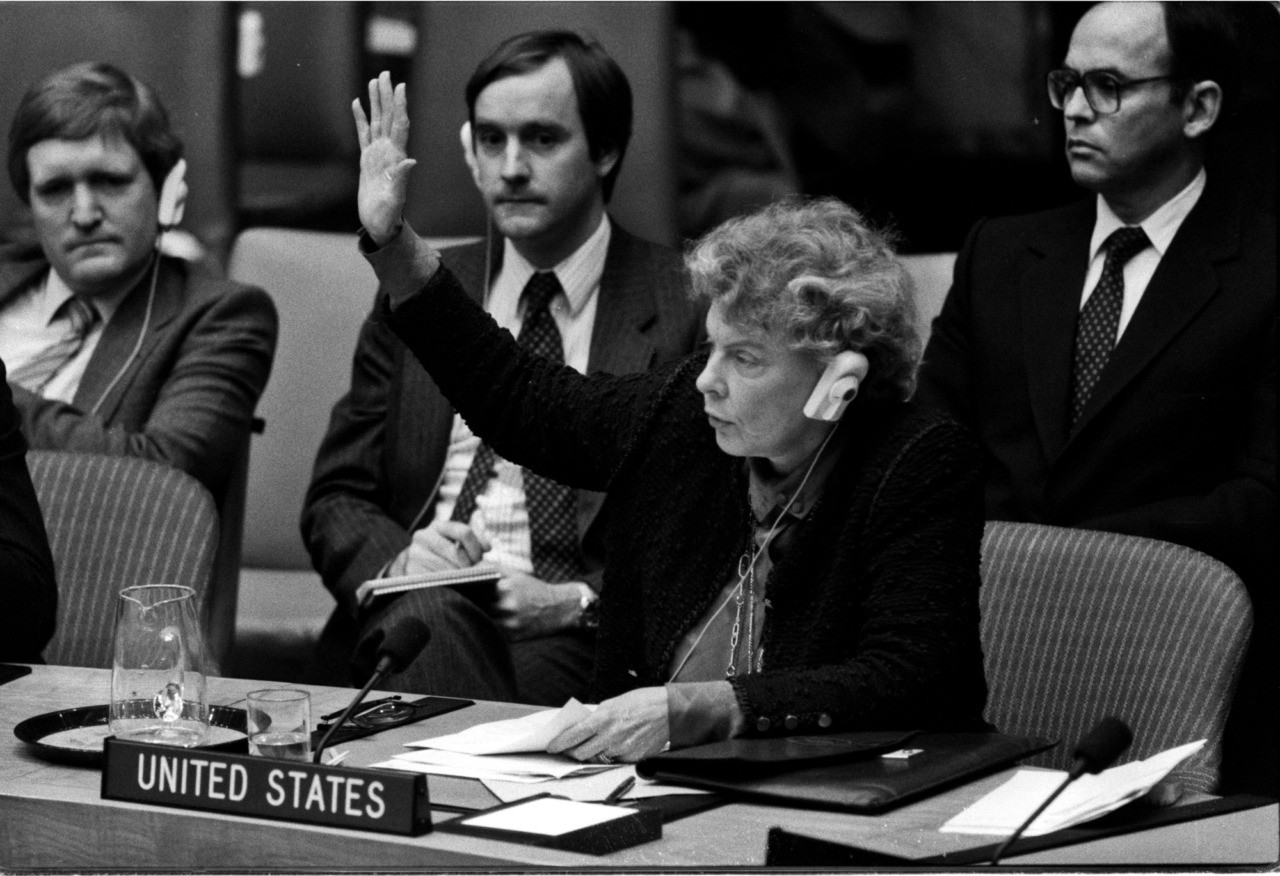
U.S. Ambassador to the United Nations Jeane Kirkpatrick raises her hand to veto a Security Council resolution on March 12, 1985. (AP Photo/Marty Lederhandler/File)

President Reagan and UN Ambassador Jeane Kirkpatrick greet Soviet Foreign Minister Andrei Gromyko during a reception for foreign dignitaries in New York, on September 24, 1984. (AP Photo/Charles Tasnadi)
And yet even with the Soviets gone, today, another empire, China, threatens us. Indeed, the Chinese, at the rate they’re going, could prove to be more of a threat to us as than the Soviets at their worst.
In the meantime, now, Secretary of State Mike Pompeo is on an eight-day trip to the Middle East, visiting our allies in the region, seeking to bolster regional strength against another rival, Iran. Some of those allies—most notably, Saudi Arabia and Egypt—are intensely controversial here at home, and so that’s another reason why Kirkpatrick’s wisdom is still so relevant, and important.

U.S. Secretary of State Mike Pompeo is greeted by Saudi’s Minister of State for Foreign Affairs Adel al-Jubeir in Riyadh on January 13, 2019, during Pompeo’s extensive Middle East tour. (ANDREW CABALLERO-REYNOLDS/AFP/Getty Images)
So just what was it in Kirkpatrick’s article that made it, and her, so influential? And why is it worth remembering four decades later?
In her piece, Kirkpatrick focused on the foreign-policy failings of President Jimmy Carter, who had so badly mishandled the Cold War against the Soviets. The immediate issue, back then, was that the Carter administration was more critical of non-democratic allies than of actively anti-democratic enemies. Hence the “double standard” in Kirkpatrick’s title; our non-democratic allies were scorned, while our anti-democratic enemies were sometimes even praised. Indeed, the Carterites seemed determined actually to depose pro-American autocratic regimes, thus paving the way for pro-Soviet totalitarian regimes.
As Kirkpatrick wrote, “It is this belief which induces the Carter administration to participate actively in the toppling of non-Communist autocracies while remaining passive in the face of Communist expansion.”
Kirkpatrick thus put her finger on a central and enduring aspect of liberalism: namely, the instinct to focus intensely on the small flaws of friends, while being blind to the larger flaws of foes. She derided this liberal impulse as a formula for “self-abasement and apology.” And we might add that this mindset never seems to change—hence, decades later, Barack Obama’s notorious “apology tours.”
At its root, such thinking seems based on the idea that if a foreign government chooses to ally itself with the U.S., then that government can’t be much good. Why not? Because, as liberals like to believe, the U.S. isn’t so good, either. And this attitude, Kirkpatrick added, was a form of “masochism.”
Indeed, when Kirkpatrick’s article appeared, the Carter administration was meekly watching as a string of allied governments were being overthrown, including those of Somalia, Afghanistan, Nicaragua, and Iran.
In each instance, we might add, the Soviets were active on the other side—sometimes in a big way, sometimes in a lesser way. And just a few years earlier, Moscow had helped to engineer communist victories in Vietnam, Cambodia, Angola, and Mozambique. This was the reality of the Cold War—the Russians were playing for keeps.

Soviet SS-25 missiles on display in Red Square on November 7, 1990, for the 73rd anniversary of the 1917 October Revolution. (ANDRE DURAND/AFP/Getty Images)
Yet in the midst of this cascade of geopolitical dominoes, the Carter administration—its diplomacy led by Secretary of State Cyrus Vance, the pluperfect guilt-ridden liberal—was not only unconcerned but, sometimes, actually pleased. That’s because the Carter administration, having come in preaching about human rights, was determined to hold friends to a far higher standard than enemies. As Kirkpatrick wrote of the administration, “It actively collaborated in the replacement of moderate autocrats friendly to American interests with less friendly autocrats of extremist persuasion.”
As Ronald Reagan often said during the Carter era, The most dangerous thing for a country is to be an ally of the U.S.
Kirkpatrick’s point was that the U.S. had to be smart about its friends and its enemies. That is, we had to realize that an imperfect friend was a lot better than an implacable enemy. In a word, it’s important to realistic, to deal with the world as it is. And it’s also important to deal with the fact that not everyone in the world is going to live up to our standards of purity—and yet if they’re friendly to us, well, that’s a good thing, not a bad thing. As Franklin D. Roosevelt’s secretary of state, Cordell Hull, reportedly once quipped about one pro-America dictator, “He may be a son of a bitch, but he’s our son of a bitch.”
Indeed, the Roosevelt administration made some notably hard-nosed choices about working with sons-of-bitches—and worse. For instance, during World War Two, FDR made the wise decision to actively aid the Soviet Union in its fight against Nazi Germany. Roosevelt’s logic was as simple as it was impeccable: The Soviets were bad, but the Nazis were much worse. After all, it was Hitler who declared war on the U.S.
FDR’s decision was intensely controversial at the time, and yet for the sake of American lives, it was absolutely necessary. The Red Army bore the brunt of the fighting in World War Two, and that was the fighting that spared our GIs. In fact, the Russians inflicted 75 percent of the casualties suffered by the Germans in the entire war.
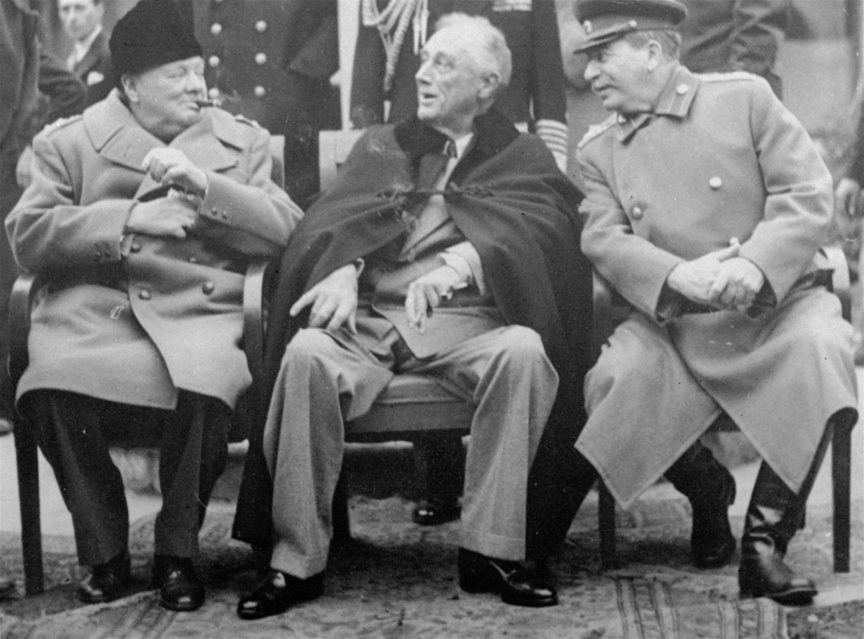
British Prime Minister Winston Churchill, U.S. President Franklin D. Roosevelt and Soviet leader Josef Stalin meet at the Livadia Palace gardens during the Yalta Conference, February 12, 1945. (AP Photo)
In her 1979 essay, Kirkpatrick never claimed that human rights and democracy were unimportant; she simply argued that the American national interest was more important. Indeed, it’s worth noting that in recent decades, some authoritarian allies of the U.S.—including South Korea, Taiwan, Argentina, Brazil, and Chile—have evolved into functioning democracies, and those countries are stronger as a result. So yes, it’s possible for our friends to improve and for the Free World to expand; it’s just that the process must be handled with the utmost care.
So now to the present day. As we have seen, Secretary Pompeo is currently traveling the Middle East, seeking to rally our allies against Iran. As Pompeo declared in Cairo on January 10, in the showcasing policy speech of his Middle East trip, “We ask every peace-loving nation of the Middle East to shoulder new responsibilities for defeating Islamist extremism wherever we find it.” And in sharp contrast to the liberal apologetics of Obama and others, Pompeo added, “The age of self-inflicted American shame is over.”
Of course, inevitably, Pompeo will be dealing with leaders, and with regimes, that don’t meet the standards of our national ideals.
For instance, there’s Saudi Arabia, which has admitted its culpability in the death of Jamal Khashoggi, the Saudi journalist. Khashoggi’s death was an outrage, but still, we must ask ourselves: Should the terrible fate of one person, who was not even a U.S. citizen, be used as a reason to overturn a seven-decade-long friendship with the Saudis?
Indeed, we must also ask: If anything were to happen to the current government in Riyadh, who would take power? Al Qaeda? ISIS? Iran? Pompeo’s answer is, in effect, that for the foreseeable future, we must stick with the current regime, and one would bet that Kirkpatrick, who died in 2006, would agree.
And then there’s Egypt. Its president, Abdel Fattah el-Sisi, is strongly pro-American; he’s even friendly to Israel. And yet he is being roasted by the Main Stream Media for human rights violations. And liberal groups, too, are joining in the chorus.
Yet the question, always, is, Compared to what? That is, what’s the plausible alternative to el-Sisi and his heavy-handed ways? It’s worth recalling that el-Sisi, while no democrat, is a vast improvement over what came before—namely, the rule of the Muslim Brotherhood. In fact, the Brotherhood was so scary that back in 2013, when el-Sisi seized power, even the Obama administration praised the move.
It’s worth keeping in mind that el-Sisi’s government must fight a low-grade war against murderous Islamist radicals; just on December 29, terrorists killed three Vietnamese tourists and an Egyptian tour guide. In response, the Egyptian military struck back, killing 40 alleged terrorists. The situation in Egypt certainly isn’t pretty, but so long as his country is under siege, what else can el-Sisi do?
In the meantime, the Egyptian strongman is trying to make his country more inclusive to minorities; just on January 6, el-Sisi, himself a Muslim, joined in the inauguration of a new Coptic Christian church in Cairo, signaling to that beleaguered community that he has their back.
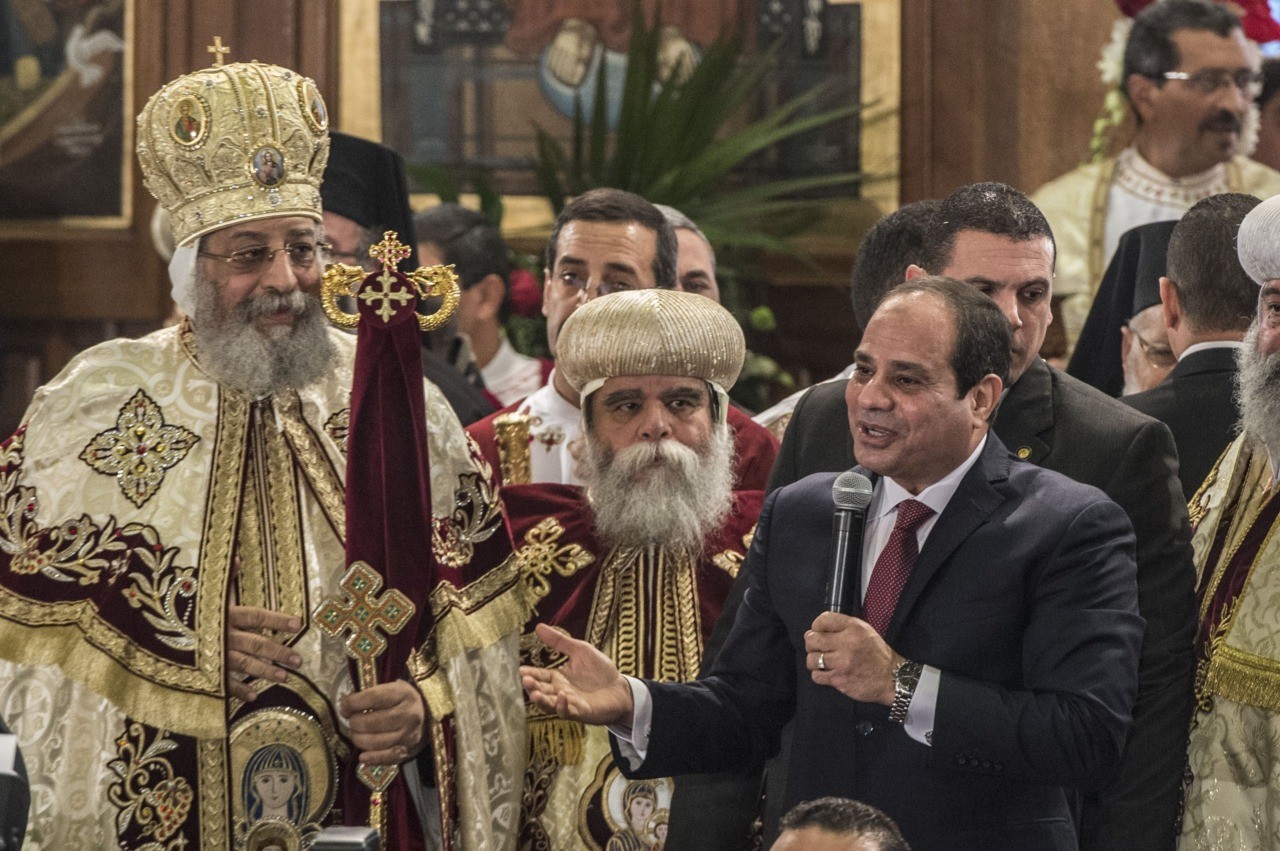
Egyptian President Abdel Fattah el-Sisi speaks during Christmas mass at St. Mark’s Coptic Orthodox Cathedral in Cairo on January 6, 2017. To his left is Coptic Christian religious leader Pope Tawadros II. (KHALED DESOUKI/AFP/Getty Images)
So yes, el-Sisi is a friend to the U.S., and, under the Trump administration, the U.S. is a friend to him. Again, it’s a safe bet that Kirkpatrick, were she still with us, would agree that it’s better to have him as a friend than someone else as an enemy.
We could go down the list of all the Arab countries that Pompeo is visiting and conclude that the regimes, noxious as they might be to human-rights purists, are a whole lot better than any possible successor. And all of them are, for sure, an improvement over the regime that the Iranians, if they could, would put in place.
Finally, looming over all pro-American countries—and, in fact, over just about every country in the world—is the threat of China. China, of course, is a human rights-violator second to none: Even if we put its Maoist mass-murderous past aside, today, we see that it is defiantly anti-democratic; it routinely suppresses Christians, as well as Tibetans and other minorities and dissidents, including the Falun Gong. Indeed, it’s reliably reported to have preemptively locked up as many as one million Muslims, without even the pretense of a legal trial.

Anti-aircraft artilleries drive past the Tiananmen Gate during a military parade commemorating the end of World War II, on September 3, 2015 in Beijing, China. (Jason Lee – Pool/Getty Images)
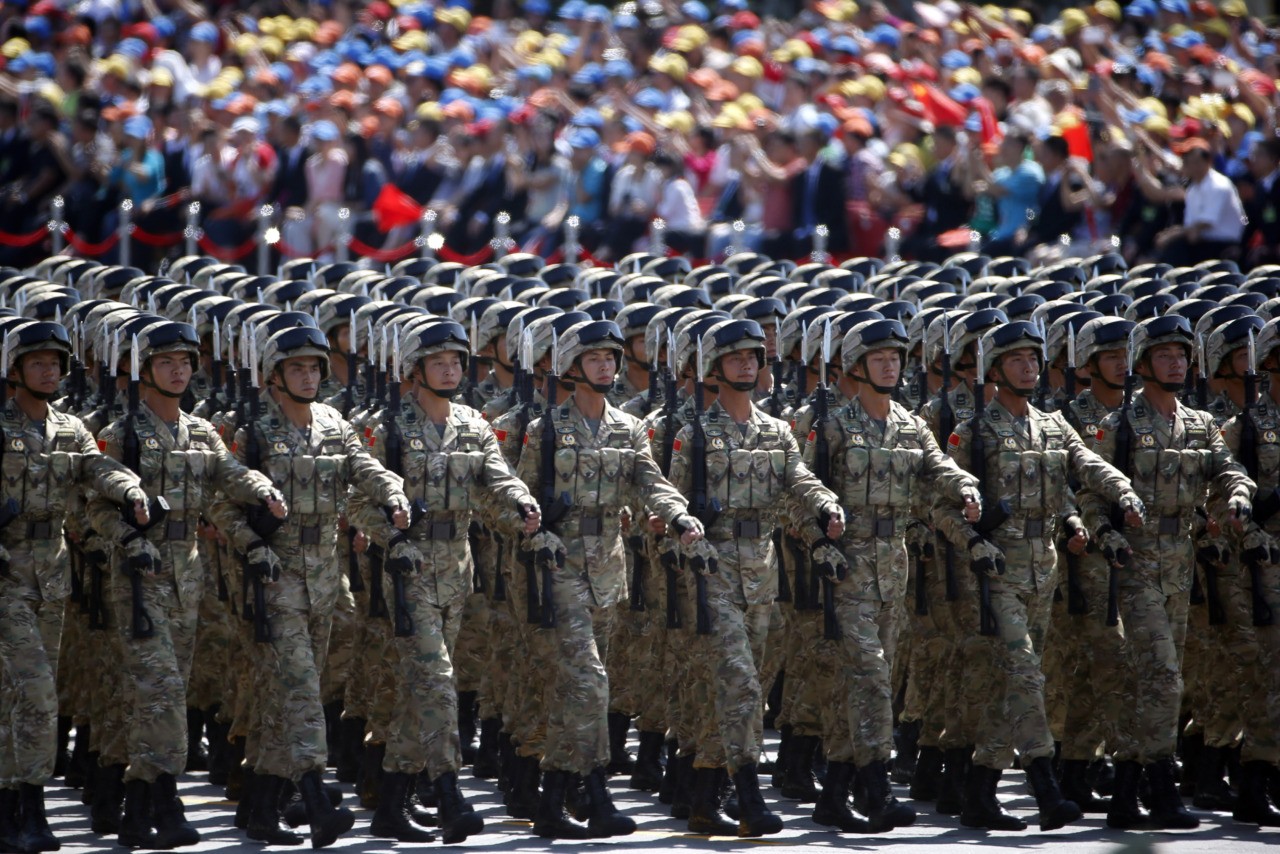
Chinese soldiers march in front of Tiananmen Gate in Beijing, China, on September 3, 2015. (AP Photo/Ng Han Guan)
Meanwhile, beyond China’s borders, the Belt and Road initiative of the People’s Republic, while officially peaceful and cooperative, is, in fact, a key part of that country’s bid for global dominion. It was Bloomberg News—not exactly a mouthpiece for hawks—that summed up China’s goals in a stark headline late last year: “Xi Jinping’s Plan to Dominate the World.” And oh yes: the Chinese are also busy hacking into America; there’s a new report on China’s cyber-espionage against the U.S. virtually every day.
So today, Pompeo and the Trump administration, operating as Kirkpatrick-type realists, believe that the U.S. has an affirmative duty to look out for itself. And that means, as a matter of strategic necessity, allying with other countries that also fear China’s rise. We can worry about the nature of those governments later; the first priority is to make sure that we don’t lose the greater geopolitical struggle.
That was Jeane Kirkpatrick’s message in 1979, and it’s a relevant message, still, in 2019. Of course, we can’t hear from her directly anymore, but her wisdom is readily available. And that’s good, because we need her clear thinking today as much as ever.

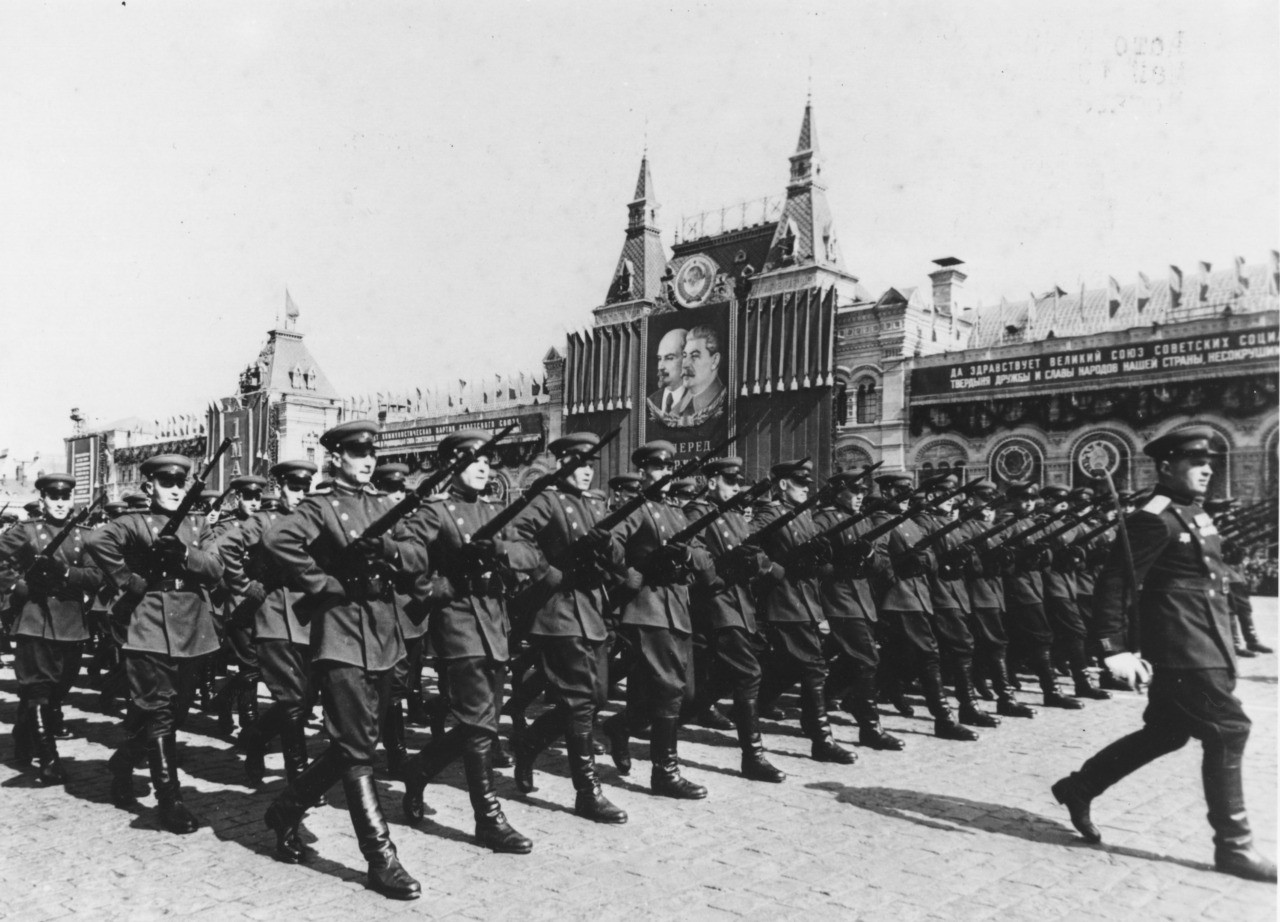
COMMENTS
Please let us know if you're having issues with commenting.